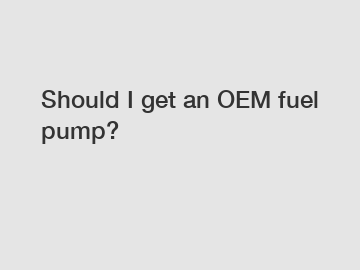Should I get an OEM fuel pump?
Should I get an OEM fuel pump?
When it comes to replacing a fuel pump in your vehicle, one question that may arise is whether to opt for an OEM (original equipment manufacturer) fuel pump or an aftermarket one. This decision is crucial as it can have implications for the performance and reliability of your vehicle. In this article, we will delve into the factors that should be considered when making this choice, weigh the pros and cons, and ultimately provide a recommendation that suits your needs.
The first factor to consider is the quality and compatibility of the fuel pump. OEM fuel pumps are specifically designed and manufactured by the same company that produced your vehicle. This ensures a high level of compatibility and reliability, as these pumps are tailored to fit seamlessly into your vehicle's fuel system. On the other hand, aftermarket fuel pumps may vary in quality and compatibility, as they are produced by third-party manufacturers. There is a risk that these pumps may not perfectly fit your vehicle or meet the same specifications as the OEM pump.

Another important aspect to consider is the warranty offered by the manufacturer. OEM fuel pumps often come with a warranty directly from the vehicle manufacturer. This warranty provides peace of mind, as you can be confident that any potential issues with the fuel pump will be covered and resolved by the vehicle manufacturer. In contrast, aftermarket fuel pumps may have limited or no warranty coverage, leaving you responsible for any repairs or replacements that may be required.
Furthermore, the OEM fuel pump can preserve the original performance and fuel efficiency of your vehicle. Automakers spend a significant amount of time and resources on research and development to optimize the performance of their vehicles, including the fuel system. The OEM fuel pump is designed to meet these specific performance requirements, ensuring that your vehicle continues to operate at its best. Aftermarket fuel pumps, although they may claim to offer improved performance, do not necessarily undergo the same rigorous testing and development process as OEM pumps.
In terms of price, aftermarket fuel pumps are often cheaper compared to OEM fuel pumps. This price difference may be appealing, especially for those on a tight budget. However, it is important to consider the long-term implications. The cost savings from opting for aftermarket pumps may be diminished if they fail prematurely or require additional repairs. Additionally, the overall performance and fuel efficiency of your vehicle may be compromised with an aftermarket pump.
In conclusion, when it comes to choosing between an OEM fuel pump and an aftermarket one, the answer ultimately depends on your priorities and budget. If you value compatibility, reliability, warranty coverage, and preserving the original performance of your vehicle, it is recommended to go for the OEM fuel pump. However, if you are on a budget and willing to take some risks regarding compatibility and warranty coverage, an aftermarket fuel pump may suit your needs. Ultimately, it is essential to weigh the pros and cons and make an informed decision that aligns with your requirements and preferences.
Contact us to discuss your requirements of Horizontal Slurry Pump Factory, Dg Series Gravel Pump, 10/8 M Slurry Pump. Our experienced sales team can help you identify the options that best suit your needs.
72
0
0


Comments
All Comments (0)